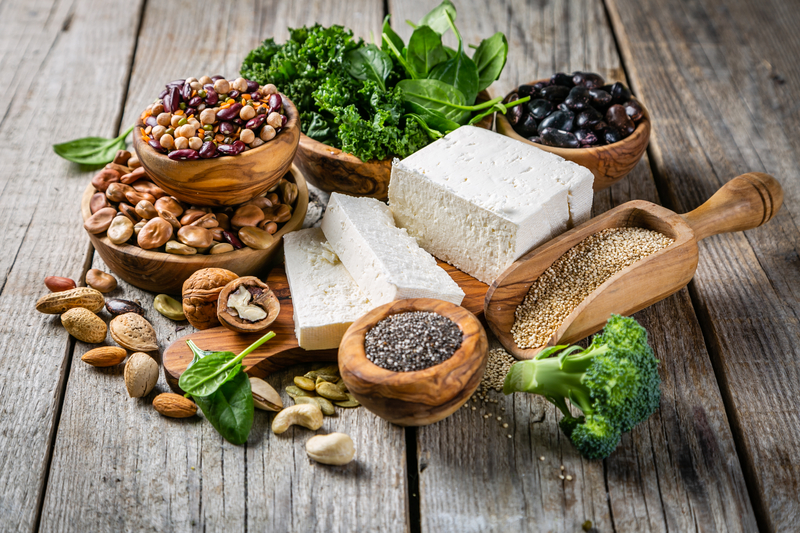10 Powerful Health Benefits of Plant-Based Proteins

Protein is a critically important part of any diet since it is one of the most essential nutrients for the body. However, as movements encouraging folks to reduce their meat consumption are becoming increasingly popular, more and more people are steering away from traditional animal protein sources and opting for plant-based options instead to achieve their daily protein needs. The reasoning behind these ever-growing movements is largely due to the health and sustainability benefits associated with consuming more plant foods.
The idea of substituting animal protein for plant-based protein is nothing new. In fact, one of the most accepted trends for incorporating more plant-based protein into any regular diet, Meatless Monday, was first introduced during the first World War to reduce consumption as a way of supporting the war effort. It was later revived as a non-profit public health initiative in 2003.
Besides being an integral part of a healthy diet, plant-based protein has been shown to produce powerful benefits, including:
10 Health Benefits of Plant-Based Proteins
1. Decreased Risk of Disease
According to research, not only does eating red meat regularly increase the risk of some diseases, but choosing plant-based proteins instead can help reduce that risk. More specifically, one of the greatest benefits of plant-based proteins is to help mitigate the risks of cardiovascular diseases. Even more, the benefits of plant-based proteins don’t require a significant or drastic change to your lifestyle and diet. Rather, consuming just three percent more plant proteins per day can reduce the risk for death by five percent, according to research. 1
2. Managing Blood Sugar
Blood sugar concerns are increasingly prevalent across the U.S. and have many people struggling to manage their blood sugar. Fortunately, diets higher in plant-based foods can help control blood sugar levels and insulin resistance.
3. Lowering Cholesterol
Consuming plant-based protein has also been found to help decrease cholesterol levels. Historically, red meat and animal proteins have been associated with increased cholesterol levels. With that said, however, cholesterol isn’t inherently bad. Cholesterol is needed by the body to build cells and produce vitamins and other hormones.
Cholesterol only becomes a problem when there’s too much of this waxy substance in your body. This build-up can combine with other substances, resulting in a thick, hard deposit that accumulates inside the arteries and increases your risk for heart disease and other cardiovascular concerns like blood clots.
4. Weight Loss
Plant-based protein can even help you achieve your weight-loss goals. Diets that are higher in protein have been shown to help maintain a healthy weight as well as support weight loss. This is likely because protein helps you feel fuller for longer, as it helps regulate hunger hormones. Plus, plant-based protein can increase these effects as many sources are naturally lower in calories than comparable animal proteins.
5. Reduce Risk for Illness
Immunity is a central topic of focus nowadays. And since antibodies and interferons—which are part of the immune system—rely on protein to function, consuming adequate amounts of protein may lead to better immune function and even fewer colds. 2 What’s more, plants provide plenty of phytonutrients, which support the body’s natural antioxidant pathways and offer a wide array of benefits.
6. Increase Satiety
Consuming more protein increases satiety, which is one reason high-protein diets provide so many benefits. 3 This is because consuming protein increases the production of hormones that help keep you full, meaning those who eat more protein have a more satisfied, full feeling for longer. 4 Yet experts believe plant-based proteins may have an edge over animal protein in their ability to keep you fuller for longer. This is believed to be due to the natural fiber content found in many plant-based proteins since fiber can curb cravings, boost digestive health, and control your appetite.
7. Boost Metabolism
One of the most well-known benefits of consuming a diet high in protein is that it supports a strong metabolism. Recent research further supports this as studies have found a low-fat, plant-based diet could boost the body’s metabolism enough to burn excess weight and fat, even without vigorous exercise. 5
8. Gut Health
Those who eat plant-based diets have a unique gut profile that contains fewer disease-causing organisms and more protective species that help keep inflammation levels low. Increasing the plant foods in your diet helps promote gut microbiome diversity. When your microbiome is kept in check, you can enjoy visible improvements to overall health and well-being.
9. Improve Mood
Consuming protein is essential for getting nutrients to the brain. Beyond this, certain foods trigger serotonin synthesis because they contain an amino acid found in proteins called tryptophan. Consuming tryptophan-containing foods is important for maintaining healthy serotonin levels. While some animal products contain this amino acid, recent studies have shown that it may not be the best source since tryptophan is found in low doses in animal products compared to other amino acids. As a result, it gets pushed out of the way, causing tryptophan levels in the brain to decline. However, when consuming plant-based foods, insulin is released due to the carbohydrate intake and causes other amino acids to be taken in as fuel, so tryptophan can be the first one to access the brain.
SPECIAL OFFER: Ageless Turmeric Supports Healthy Inflammation Levels & Detoxification. Now Up to 71% Off.
10. Healthy Fats
When it comes to getting your daily intake of healthy fats, doing so through plant proteins such as nuts and seeds couldn’t be easier. Many plant proteins are not only a super convenient way to add healthy fats to your diet, which balance hormones, control sugar levels, and maintain proper appetite, but they’re also easily digested by the body.
Additional Benefits of Plant-Based Proteins
While the health benefits of plant-based protein alone are worthwhile, they are not the only results of shifting away from or eliminating animal protein from your diet. Many people also choose plant-based proteins for other benefits that can positively impact our environment.
1. Reduced Environmental Impact
One of the most significant benefits of substituting animal protein for plant-based protein is the decreased environmental impact. A plant-based diet has been linked to preserving water resources, maintaining the diversity of plant and animal species, and reduce the prevalence of greenhouse gases like methane and nitrous oxide.
2. Compassion for Animals
Similarly, a reduction in animal protein always has the added benefit of being more compassionate to the animals that would have otherwise been raised for consumption. For some, this is the main reason to transition to a plant-based lifestyle; for others, it can just be a pleasant bonus.
Sources of Plant-Based Protein
When choosing plant-based proteins, it is important to know that most foods have some amount of protein in them. However, certain foods are richer in protein than others. Some of the top plant-based protein sources include:
- Almond Butter
- Amaranth
- Black Beans
- Buckwheat
- Chia Seeds
- Chickpeas
- Green Peas
- Hemp Seeds
- Kale
- Kidney Beans
- Lentils
- Nutritional Yeast
- Oatmeal
- Pumpkin Seeds
- Quinoa
- Soy
- Spirulina
Likewise, if you are looking for an easy on-the-go option for incorporating more plant-based protein into your diet, BioTRUST Low Carb Plant is a high-quality source of plant-based protein with each serving of Low Carb Plant featuring 20 grams of high-quality protein. And, if you want to try your hand at cooking up some delicious-plant based meals, try out our “Impossibly” Tasty Vegan Burger Recipe or any of our other delicious high-protein vegan recipes!







